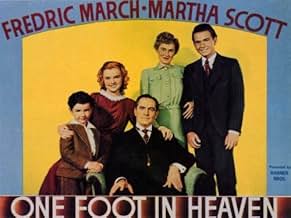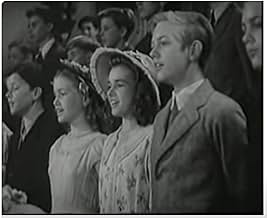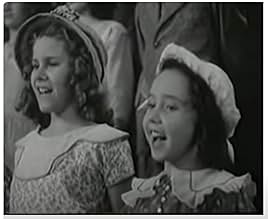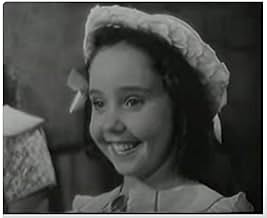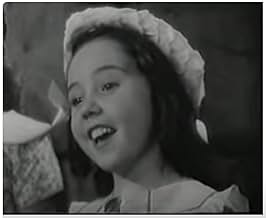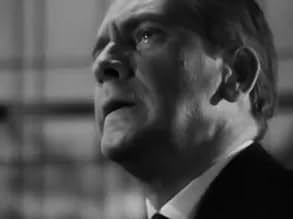IMDb RATING
6.6/10
1.6K
YOUR RATING
Episodic look at the life of a minister and his family as they move from one parish to another.Episodic look at the life of a minister and his family as they move from one parish to another.Episodic look at the life of a minister and his family as they move from one parish to another.
- Nominated for 1 Oscar
- 2 wins & 1 nomination total
Dorothy Adams
- Woman Behind Hope at Baptism
- (uncredited)
Joan Anderson
- Child
- (uncredited)
- Director
- Writers
- All cast & crew
- Production, box office & more at IMDbPro
Featured reviews
one foot in heaven is the type of movie that makes a person want to look into how their life has effected other people. (just as the movie about george baily in it's a wonderful life. a simple story about one man's life and how he was able to do, not exciting things, but long lasting things that made people better for having know him. it is great to find this movie playing on tv, but it should be put on dvd or tape for us to enjoy much more often.
Of course, it's impossible to tell how much of this story is dramatized and how much is real. And the gothic ideals of what a "church" should be are now very period--as they should be. But what makes this film work is the human nature presented through the characters. I say this because, as a (United) Methodist pastor, I know and have known the very types of characters represented in this film. And as one who sometimes wonders whether I'm fulfilling the mandate of my calling, this film was a welcome and refreshing reminder of maintaining my focus. It is probably a good insight for church members who want to get a glimpse of what life is truly like for a clergy person, then as now (though my parsonage is countless times better than what poor Dr. Spence had to live with!). A recommended dose of reality for the clergy-weary and the clergy-wary alike!
Warner Bros. 1941 "One Foot in Heaven" was an inspired film. Based on a real person, William Spence, and adapted the from the biographic book by his son, Hartzel Spence, showed a truly rare individual who gave up his own medical ambition when he heard the call to serve as a Methodist minister. Directed by Irving Rapper, and with a musical score by Max Steiner, it was a crowd pleaser that continues to capture new friends, even today.
The success of the film lies on the fantastic portrayal of William Spence by Fredric March, who was at the height of his career. The character of Mr. Spence comes across as a no-nonsense man who must deal with the narrow mindedness of the small Iowa community he is sent to. Coming with his young wife, Mr. Spence was not prepared for what he would find in Laketon. The beautiful Hope, who came from another world feels inadequate in dealing with the church ladies who come to help her.
Mr. Spence gave his life to the town that didn't want any changes in their lives. When he proposed a new church to replace the older one, he meets the resistance of the elder moneyed classes. When they turn against him, they use every tactic, including slander to get him to his knees, but fortunately, he knew better. At the end, he was successful in giving the town what he envisioned was his contribution to the community where he spent his life.
Mr. March's performance is key that brings the action together. Lovely Martha Scott plays Hope Spence with dignity. The amazing supporting cast is wonderful. Gene Lockhart, Beulah Bondi, Moroni Olsen, and Grant Mitchell, among others do excellent job, something that was a hallmark of the Warner films of the time.
The success of the film lies on the fantastic portrayal of William Spence by Fredric March, who was at the height of his career. The character of Mr. Spence comes across as a no-nonsense man who must deal with the narrow mindedness of the small Iowa community he is sent to. Coming with his young wife, Mr. Spence was not prepared for what he would find in Laketon. The beautiful Hope, who came from another world feels inadequate in dealing with the church ladies who come to help her.
Mr. Spence gave his life to the town that didn't want any changes in their lives. When he proposed a new church to replace the older one, he meets the resistance of the elder moneyed classes. When they turn against him, they use every tactic, including slander to get him to his knees, but fortunately, he knew better. At the end, he was successful in giving the town what he envisioned was his contribution to the community where he spent his life.
Mr. March's performance is key that brings the action together. Lovely Martha Scott plays Hope Spence with dignity. The amazing supporting cast is wonderful. Gene Lockhart, Beulah Bondi, Moroni Olsen, and Grant Mitchell, among others do excellent job, something that was a hallmark of the Warner films of the time.
For those who are cynical about the religious life, here's a movie which ought to put some of that cynicism to rest. "One Foot in Heaven" is the true story of a Methodist preacher and his family, and it rings true, not just for the humanity Frederic March brings to his role as the preacher, but for the situations and characters that many of us, regardless of creed, will easily relate to. My dad used to say, A church is its people. I think One Foot in Heaven is a perfect illustration of this truth. Though this is a story about a preacher, we aren't preached at. There's a wonderful scene, with the preacher gently urging his agnostic doctor to start coming to church. He doesn't beat him over the head with a Bible but tries a more "humanist" approach.
Someone else has compared One Foot in Heaven with It's a Wonderful Life. Another film to compare is Going My Way. In fact, One Foot in Heaven and Going My Way were released just a year apart. There are story similarities, like the building of new churches (The Bishop's Wife is another example), but it's interesting to see how religion in the community is seen respectively through Protestant and Catholic lenses.
Then, there's the final scene. In some ways it's corny, but it still moves me. It hearkens to a time when religion wasn't sectarian but seamlessly interwoven in community life, unselfconsciously and unostentatiously. It was before the battle lines between religionists and secularists were drawn, when America had a "civil" religion. Alas, a time past.
Someone else has compared One Foot in Heaven with It's a Wonderful Life. Another film to compare is Going My Way. In fact, One Foot in Heaven and Going My Way were released just a year apart. There are story similarities, like the building of new churches (The Bishop's Wife is another example), but it's interesting to see how religion in the community is seen respectively through Protestant and Catholic lenses.
Then, there's the final scene. In some ways it's corny, but it still moves me. It hearkens to a time when religion wasn't sectarian but seamlessly interwoven in community life, unselfconsciously and unostentatiously. It was before the battle lines between religionists and secularists were drawn, when America had a "civil" religion. Alas, a time past.
ONE FOOT IN HEAVEN is a wonderful story of what it takes to not only endure the difficulties in being a minister; but how these problems build character.
Year after year of allowing church bosses and bullies to dictate what will and won't be allowed, the minister finally learns how to beat them at their own game.
It has so many touches of warmth, in which a subliminal message of truth is going on coupled with hints of blackmail and leverage.
When Dr. Spence refuses to name his own son Wm. Spence, Jr. because he says, "Junior is a sissy name and I won't have my son being a sissy!" his wife decides to coerce him by holding back on the cooking of dinner until he gives in to her wishes. Thinking she's won, he says he'll name the baby in church next Sunday. As he asks for the name and she announces to the congregation, "William Spence, Junior," he repeats it as "William Frasier Spence" ("named after my grand old Scottish Uncle Frasier--and I don't mean the one who was hanged as a horse thief!")
It is this war of wills that carries the story; making each episode build to the next one. Tempered with touches of right and wrong, it is a classic! A must see! Good conflict, good story line.
Nominated for an Academy Award for Best Picture.
Year after year of allowing church bosses and bullies to dictate what will and won't be allowed, the minister finally learns how to beat them at their own game.
It has so many touches of warmth, in which a subliminal message of truth is going on coupled with hints of blackmail and leverage.
When Dr. Spence refuses to name his own son Wm. Spence, Jr. because he says, "Junior is a sissy name and I won't have my son being a sissy!" his wife decides to coerce him by holding back on the cooking of dinner until he gives in to her wishes. Thinking she's won, he says he'll name the baby in church next Sunday. As he asks for the name and she announces to the congregation, "William Spence, Junior," he repeats it as "William Frasier Spence" ("named after my grand old Scottish Uncle Frasier--and I don't mean the one who was hanged as a horse thief!")
It is this war of wills that carries the story; making each episode build to the next one. Tempered with touches of right and wrong, it is a classic! A must see! Good conflict, good story line.
Nominated for an Academy Award for Best Picture.
Did you know
- TriviaWilliam S. Hart was the guest of honor at the Hollywood premiere of this movie, since his movie The Silent Man (1917) figures prominently in the plot.
- GoofsAt the beginning of the movie, William Spence (Fredric March) announces he has been "called" to the church and will become a pastor in the Methodist Church. His soon-to-be mother-in-law, Mrs. Norris (Nana Bryant)), replies that she would have preferred that he'd joined the Episcopal Church. At that time, in Canada, the dominant church was the Church of England, not the Episcopal Church. That is predominantly a US institution born out of the American Revolution.
- Quotes
William Spence: [to his son, Hartzell] A pastor's family are in a special category. We are uh... Well, It's as if we walked a sort of tightrope. Balancing with one foot on earth and one foot already in heaven.
- ConnectionsEdited into Happy Times and Jolly Moments (1943)
- SoundtracksThe Children's Prayer
(uncredited)
from "Hansel and Gretel"
Music by Engelbert Humperdinck
Libretto by Adelheid Wette
Sung by the Robert Mitchell Choir
Details
- Release date
- Country of origin
- Language
- Also known as
- Con un pie en el cielo
- Filming locations
- Production company
- See more company credits at IMDbPro
- Runtime
- 1h 48m(108 min)
- Color
- Aspect ratio
- 1.37 : 1
Contribute to this page
Suggest an edit or add missing content


